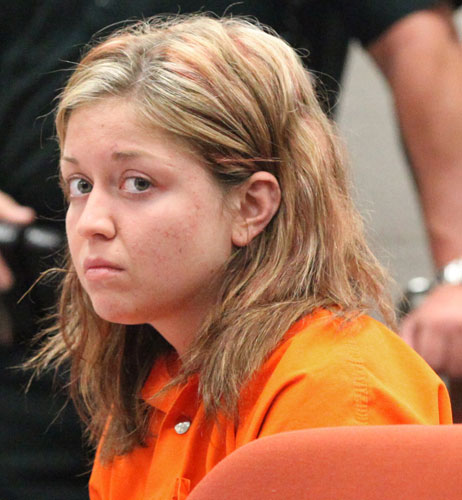
INDIAN RIVER COUNTY — The State Attorney’s Office has again offered a plea deal to now-19-year-old Kaitlyn Hunt, the former Sebastian River High School student accused of having a sexual relationship with her underage girlfriend.
This is the third plea deal proffered to Hunt and it remains unknown at this time whether she will accept it.
Under the terms of the plea deal, Hunt would avoid prison in lieu of three years of felony supervision. She would remain in the county jail until Dec. 20.
Hunt would not have to register as a sex offender, according to the plea deal, but she would have to undergo a psychological evaluation and complete any recommended treatment at her own expense.
If Hunt abides by the conditions of the plea deal, she would avoid being labeled a convicted felon. However, if she were to violate the conditions, the court could revoke the plea deal and sentence her accordingly, according to the State Attorney’s Office.
Hunt has been charged with two counts of lewd and lascivious battery of child age 12-16, and transmission of material harmful to a minor. The lewd and lascivious battery charges carry a maximum 15-year prison sentence.
The plea deal makes several demands of Hunt, including requiring her to have no contact directly or indirectly with the underage student. Hunt would not be allowed to use electronic communications directly or through third parties to make contact, either.
In August, Hunt’s pre-trial release was revoked after the State Attorney’s Office and law enforcement became aware she was communicating with the victim through an iPod. More than 20,000 texts, images and other files were exchanged between the pair, violating the court order in place.
To ensure that Hunt complies, the plea deal states that she must submit to “warrantless search and seizure” by authorities of her home, car, phone and computer. She must also provide authorities “immediate and full access” to telephone and internet communications. Such information would include call and text logs, messages, instant messaging, emails, social media accounts, Skype and similar accounts, as well as account names, numbers and passwords.
Hunt would not be allowed to use accounts held by other people nor would she be allowed to let someone else use an account she, herself, holds.
“The terms of the offer are measured to accomplish the principal goal of protecting the victim,” wrote Assistant State Attorney Brian Workman. “After four months of incarceration, Ms. Hunt will be supervised on community control (house arrest) by the Department of Corrections. She will not be permitted to leave home without the permission of her community control officer who will have the ability to track her movements by GPS. She will be permitted to attend school and other approved functions. This is the most stringent form of community supervision in Florida. It gives Ms. Hunt the opportunity to demonstrate that she can follow the law. If she successfully completes her supervision, she will avoid becoming a convicted felon. Of course, if she violates the terms of her supervision, the judge may sentence her to any lawful sentence, including prison.”
According to Workman, the victim and her parents agree to the terms of the plea deal.
Their attorney, Charles Sullivan Jr., said he had not received a copy of the plea deal but was familiar with the details.
“I believe this is a fair and balanced offer that protects the victim while giving Ms. Hunt the ability to avoid the most severe consequences of her crimes by demonstrating that no further punishment is necessary,” Workman wrote.
Hunt’s attorney, A. Julia Graves, declined to comment on the plea deal.
The State Attorney’s Office has not set a firm deadline for a response, but Workman wrote that he would appreciate a prompt reply.



